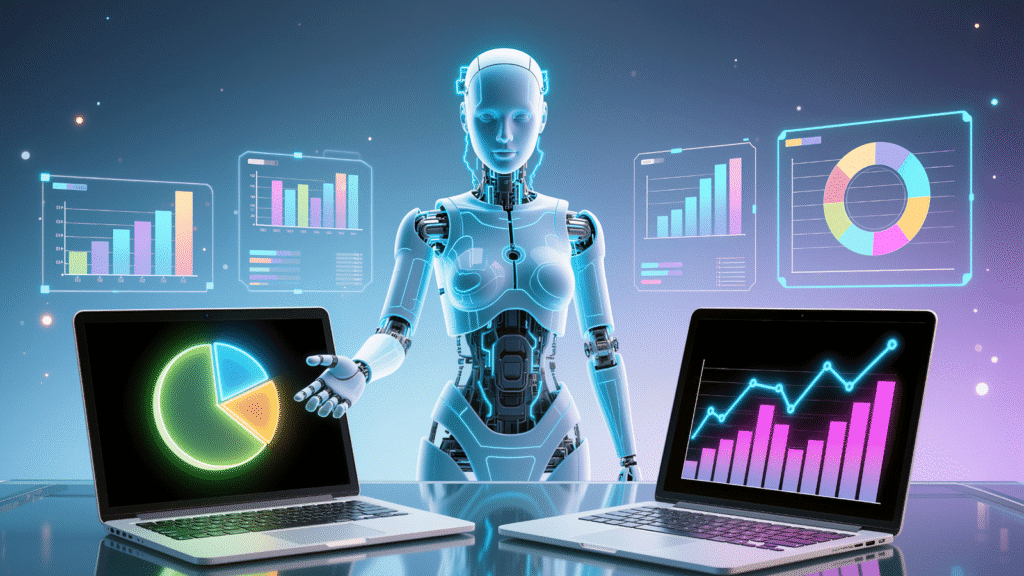Why Personal Finance is Transforming in 2025
In recent years, the approach to managing finances has evolved more dramatically than in the last twenty years combined. Factors such as inflation, increasing living expenses, and the rise of fintech applications have compelled many individuals to reassess their budgeting strategies, savings, and methods of generating additional income. The most significant change by 2025 is evident: we are transitioning from traditional spreadsheets to AI budgeting tools that adapt to our spending habits and provide real-time recommendations.
Rather than waiting until the end of the month to review a bank statement and ponder “Where did my money go?”, a growing number of users now receive timely notifications throughout the month: “This week you spent 25% more on food delivery than usual” or “If you transfer 80 dollars today, you will achieve your savings goal before month-end.” This proactive assistance is gradually becoming the new norm.
From Cash Envelopes to Digital ‘Smart Envelopes’
The cash envelope system was once a favored method for controlling overspending. By 2025, this concept remains relevant, but has evolved into a digital format. Numerous applications now enable users to create virtual envelopes for expenses such as rent, groceries, entertainment, travel, and debt repayment. The key distinction is that these envelopes are now dynamic: they can automatically adjust based on changes in income or unexpected expenses.
Certain platforms even integrate these envelopes with AI forecasts. For instance, if the app detects that you typically travel in August or tend to spend more during the holiday season, it can recommend increasing your “travel” or “gifts” envelope ahead of time. The aim is clear: to minimize surprises, alleviate financial stress, and provide a comprehensive view of your actual lifestyle.
The Resurgence of Saving: Automating What We Often Overlook
For many individuals, the challenge of saving arises not from mathematical complexity, but from behavioral habits. We often forget to save. Consequently, automation is becoming an essential aspect of contemporary personal finance. Instead of manually deciding each month how much to allocate to savings, users can establish a rule and allow technology to handle the rest.
One particularly effective approach is to pair automation with a high-yield savings account. This strategy ensures that every small transfer works diligently behind the scenes, earning more interest than a conventional bank account. By 2025, numerous banks and fintech companies are competing in this arena, providing improved rates, bonus interest for consistent savers, and instant access through mobile applications.
Side Hustles and the Creator Economy: Innovative Income Opportunities
Simultaneously, personal finance is not solely about reducing expenses or increasing savings. A significant component of modern financial management involves uncovering new income sources. The creator economy, alongside freelancing platforms and remote work, has simplified the process of exploring side projects.
Individuals are on the lookout for best side hustle ideas that align with their skills and available time: online tutoring, content creation, affiliate marketing, consulting, selling digital products, and much more. The pivotal change in 2025 is that these activities are no longer perceived as mere “extras.” For some, they represent a substantial secondary income; for others, they serve as a safety net should their primary job shift.
AI as Your Personal Money Mentor
Another prominent trend is utilizing AI not only for tracking finances but also for behavioral coaching. Certain tools can analyze your historical transactions and reveal patterns you may not have recognized: identifying when you make impulse purchases out of boredom, which subscriptions you have forgotten, or which spending categories diverge from your financial goals.
Practically, this translates to receiving specific, actionable recommendations rather than vague suggestions. Instead of “Spend less on dining out,” you might receive guidance such as “If you cut back on food delivery by just one order each week, you can completely fund your weekend getaway in three months.” This kind of tailored scenario empowers individuals to feel more in control and motivated to adhere to their financial plans.
How to Keep Up with These Developments
The realm of personal finance will continue to change, yet several foundational principles will endure. First, clarity: understand your income, expenses, and the reasons behind them. Second, flexibility: be prepared to modify your budget and objectives as life evolves. Third, curiosity: explore new tools, innovative saving techniques, and fresh earning methods.
In 2025, success will not belong to those who never make financial mistakes, but to those who learn swiftly, automate positive habits, and leverage technology as a supportive ally. Whether you are refining your budget, selecting a superior savings account, or embarking on a small side venture, the new generation of digital tools is designed to enhance your decision-making—not replace it.



